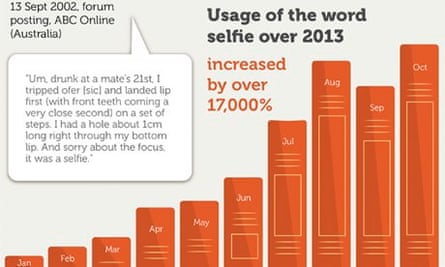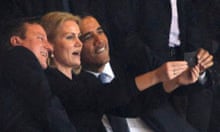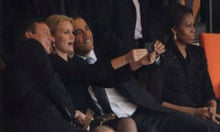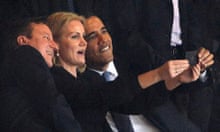Selfie – "a photograph that one has taken of oneself, typically one taken with a smartphone or webcam and uploaded to a social media website" – has been named word of the year by Oxford Dictionaries editors, after the frequency of its usage increased by 17,000% over the past 12 months.
Editorial director Judy Pearsall said: "Using the Oxford Dictionaries language research programme, which collects around 150m words of current English in use each month, we can see a phenomenal upward trend in the use of selfie in 2013, and this helped to cement its selection."
The word can be traced back to a post on an Australian online forum in 2002: "Um, drunk at a mates 21st, I tripped ofer [sic] and landed lip first (with front teeth coming a very close second) on a set of steps. I had a hole about 1cm long right through my bottom lip. And sorry about the focus, it was a selfie."
It has since produced an array of spinoffs, including helfie (hairstyle self), belfie (bum selfie), welfie (workout selfie), drelfie (drunken selfie), and even bookshelfie – a snap taken for the purposes of literary self-promotion.
Judy Pearsall explained its evolution: "The hashtag #selfie appeared on the photo-sharing website Flickr as early as 2004, but usage wasn't widespread until around 2012.
"In early examples, the word was often spelled with a -y, but the -ie form is more common today and has become the accepted spelling. The use of the diminutive -ie suffix is notable, as it helps to turn an essentially narcissistic enterprise into something rather more endearing. Australian English has something of a penchant for -ie words … so this helps to support the evidence for selfie having originated in Australia."

Oxford Dictionaries' Word of the Year shortlist
bedroom tax, noun, informal:
(in the UK) a reduction in the amount of housing benefit paid to a claimant if the property they are renting is judged to have more bedrooms than is necessary for the number of the people in the household, according to criteria set down by the government.
The Welfare Reform Act 2012 proposed various changes to the rules governing social security benefits in the UK, including an "under-occupancy penalty" to be imposed on households that were receiving housing benefit and that were judged to have bedrooms surplus to their requirements. Critics and opponents soon began to refer to the new penalty as the "bedroom tax". The first references to the bedroom tax in our corpus appear in 2011 but usage increased dramatically around the time this new provision came into force, in April 2013.
binge-watch, verb:
to watch multiple episodes of a television programme in rapid succession, typically by means of DVDs or digital streaming. [ORIGIN 1990s: from BINGE + WATCH, after BINGE-EAT, BINGE-DRINK.]
The word binge-watch has been used in the circles of television fandom since the late 1990s, but it has exploded into mainstream use in 2013. The word has come into its own with the advent of on-demand viewing and online streaming. In 2013, binge-watching got a further boost when the video-streaming company Netflix began releasing episodes of its serial programming all at once. In the past year, binge-watching chalked up almost as much evidence on our corpus as binge-eating. (Binge-drinking remains unchallenged in the top position.)
bitcoin, noun:
a digital currency in which transactions can be performed without the need for a central bank. Also, a unit of bitcoin. [ORIGIN early 21st century: from BIT, in the computing sense of "a unit of information" and COIN.]
The term first appeared in late 2008 in a research paper, and the first bitcoins were created in 2009. By 2012, the virtual currency was attracting wider attention and we began to see its steadily increasing use. A spike in usage was apparent in March–May 2013, which may be due in part to the market crash around that time.
olinguito, noun:
a small furry mammal found in mountain forests in Colombia and Ecuador, the smallest member of the raccoon family. [ORIGIN 2013: diminutive form of OLINGO, a South American mammal resembling the kinkajou.]
The discovery of the olinguito was announced by the Smithsonian Museum of Natural History in August: it represented the first identification of a new species of mammalian carnivore in the western hemisphere in 35 years. Extensive coverage of the story in the world's media was guaranteed by the animal's appearance – it was described as looking like a cross between a teddy bear and a domestic cat.
schmeat, noun, informal:
a form of meat produced synthetically from biological tissue. [ORIGIN early 21st century: perhaps from SYNTHETIC and MEAT, influenced by the use of "- -, schm - -" as a disparaging or dismissive exclamation.]
Man-made meat is more commonly (and neutrally) known as "in-vitro meat" or "cultured meat". This word remains very rare, largely because the phenomenon it refers to is still in its infancy. However, in August 2013, the world's first hamburger made with in-vitro meat was served up by Dutch scientists, raising the possibility that the general public may have more occasion to use this word in the not-too-distant future.
showrooming, noun:
the practice of visiting a shop or shops in order to examine a product before buying it online at a lower price. [ORIGIN early 21st century: from SHOWROOM, "a room used to display goods for sale".]
Before 2013, there were just a handful of examples of this on our corpus. We've seen this figure increase significantly, along with use of the related verb "to showroom" and the noun "showroomer".
twerk, verb:
dance to popular music in a sexually provocative manner involving thrusting hip movements and a low, squatting stance. [ORIGIN 1990s: probably an alteration of WORK.]
Twerk seems to have arisen in the early 1990s, in the context of the bounce music scene in New Orleans. By the mid-1990s, we see evidence of twerk being used online in newsgroups to describe a specific type of dancing. The most likely theory about the origin of this word is that it is an alteration of work, because that word has a history of being used in similar ways, with dancers being encouraged to "work it". The "t" could be a result of blending with another word such as twist or twitch. Its association with Miley Cyrus this summer created a huge spike of usage in the media, especially social media.
Previous words of the year
2012 Omnishambles
2011 squeezed middle
2010 big society
2009 simples
2008 credit crunch
2007 carbon footprint
2006 bovvered
2005 sudoku
2004 chav









Comments (…)
Sign in or create your Guardian account to join the discussion